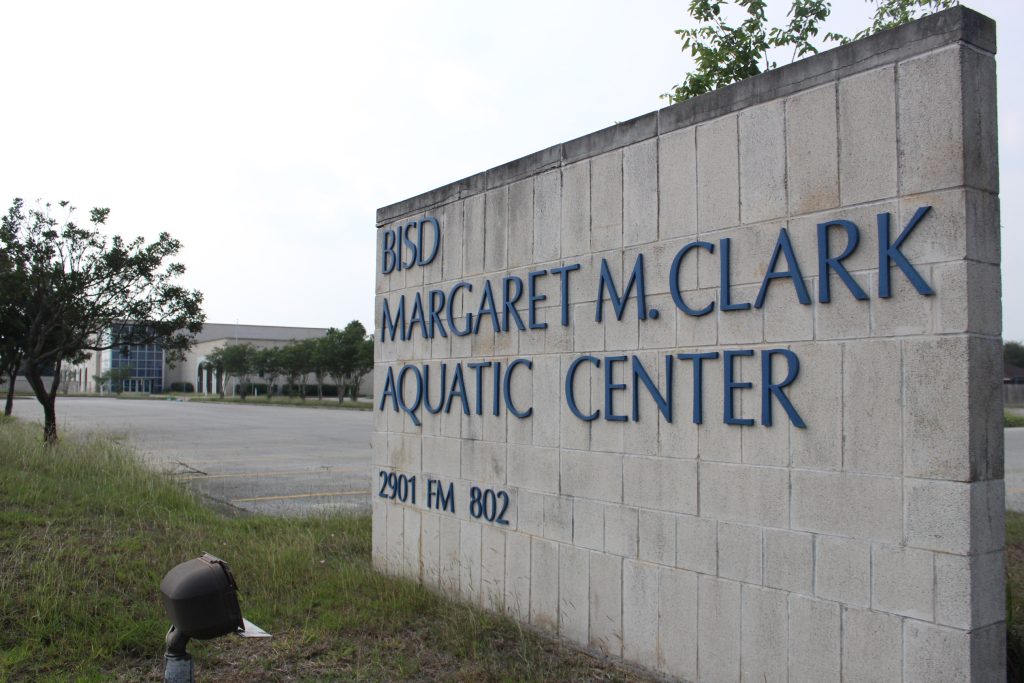By STEFAN MODRICH, Staff Writer
HARLINGEN — According to a report from the Centers for Disease Control on March 10, “there is no evidence that the COVID-19 coronavirus can be spread through the use of pools and hot tubs.”
Nonetheless, the two largest aquatics facilities in the East Valley have suspended their operations in an effort to slow the spread of the pandemic.
Sandra Flinn, aquatics coordinator at the Harlingen CISD Aquatic Center, said the facility has followed guidelines from federal, state and local governments.
With the exception of a meeting last week for essential staff, the Harlingen Aquatic Center has not been in operation since March 13, the last day before the start of Spring Break.
“All of this kind of cascaded and things started happening rapidly over Spring Break,” Flinn said. “As we were going into Spring Break, we were still a little unsure of what the following week would bring. We all intended to come back.”
The Margaret M. Clark Aquatic Center in Brownsville previously posted on its website it was closed until April 10, and it has since updated its homepage to reflect that the facility will be closed indefinitely, as of late Saturday.
Monica Rosales, administrator of the Clark Aquatic Center, said no one will lose their credit or money paid toward swimming lessons or membership dues.
“We will honor payments received and extend due dates,” Rosales said. “I know people are anxious, but we will take care of our stakeholders and do right by them to ensure whatever money they have invested is honored.”
Flinn said no one is being charged any membership fees at this time. Payroll deductions will cease for HCISD employees who had opted for a $10 monthly fee to be taken out of their paychecks in order to have membership privileges at the facility.
“Very few people pay (for a membership) in advance,” Flinn said. “But if they have paid in advance, we plan on honoring those (payments) when we reopen.”
In addition, Flinn said HCISD’s facility has not lost any members as a result of the pandemic.
It is unclear how soon the aquatic center in Harlingen could resume operations.
Among the programs in Harlingen that have been impacted are its SEAL swim lessons for second graders, which could be postponed until fall, and water polo, the next sport on the local aquatic calendar.
Flinn reiterated that as a supervisor for a school district-governed facility, she and her team are obligated to seek guidance from state, local and federal officials on how to proceed as the crisis develops.
She said the Harlingen aquatic center has one part-time employee who has retained his job but is not accruing hours.
Aside from its two administrators and two coaches, the building’s full-time staff consists of 11 employees: A secretary, lifeguards/swim instructors, certified pool operators and custodians. Flinn said the full-time staffers have been ensured that the district is committed to paying them through the duration of the COVID-19 pandemic.
All 22 full-time and six part-time employees at the Brownsville aquatic center will continue to be paid.
For swimmers looking to stay in shape while in quarantine, the Harlingen Aquatic Center’s Facebook page features several fitness videos. USA Swimming has posted a series of resources on its website for “dryland maintenance,” including workout circuits, and tips from sports psychologists for competitors confronting the reality of postponed or canceled competitions.
“We’re doing the best we can working from home, working remotely,” Flinn said. “Full-time employees are working to post daily free workout activities that people can do at home.
“We’re continuing on the mission of athletics and with educating kids, it just looks different.”

